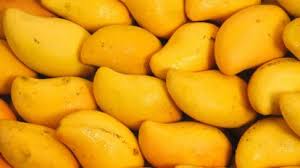Centre to share load with Andhra govt in DBT scheme to help Totapuri mango farmers

In a major relief to Totapuri mango farmers in Andhra Pradesh, the Union government has agreed to share the financial responsibility of the Direct Benefit Transfer (DBT) scheme with the state. This move aims to support farmers who have suffered heavy losses due to falling prices and unpredictable weather.
The joint initiative is expected to improve the delivery of financial aid. It will help thousands of farmers struggling to recover from a tough mango season.
Totapuri Mango: A Key Crop for Andhra
Totapuri mangoes are popular for their tangy flavor and long, distinct shape. They are one of the most commercially grown mango varieties in southern Andhra Pradesh. Farmers in districts such as Chittoor, Kadapa, and Annamayya depend on this crop for their livelihood.
This variety plays a vital role in India’s mango pulp industry. Several processing units in Chittoor rely heavily on Totapuri harvests. However, due to market oversupply and weak demand, farmers have seen their incomes drop sharply.
DBT Scheme: A Lifeline with New Support
The Andhra Pradesh government had already introduced the DBT scheme to support distressed farmers. The scheme offers per-acre compensation when crops fail or prices fall drastically. Until now, the state funded the entire scheme on its own.
Now, with the Centre stepping in, the funding burden will be shared. Reports suggest a 60:40 cost split between the Centre and the state. This step is expected to expand the number of eligible farmers and allow faster payments.
Why This Move Matters Now
This year, Totapuri mango prices crashed to as low as ₹3 to ₹5 per kg. Many farmers could not recover even the cost of harvesting. Some chose to leave the fruit unpicked, as labor costs were too high.
Farmer groups and political leaders had been demanding central support. In response, officials from the Union Agriculture Ministry visited the region. After assessing the ground situation, the Centre decided to co-fund the DBT scheme.
This step signals a broader national focus on fruit-growing regions. So far, many such areas have been left out of major farm support policies.
New Benefits Under the Revised Scheme
The revised DBT scheme brings several changes:
- Shared cost: The Centre will pay 60% of the compensation. Andhra Pradesh will cover the rest.
- Broader coverage: More small and marginal farmers will now qualify.
- Faster payouts: Central support can reduce delays in disbursing funds.
- Seasonal support: The scheme applies to this season and the next, offering short-term stability.
Farmer Reactions: Hope Mixed with Concern
Many farmers see the Centre’s move as a step in the right direction. “This gives us some hope. At least the burden is now shared,” said Ramesh, a mango grower in Madanapalle.
However, concerns remain about the pace of implementation. “Relief must reach us during the season, not after months,” said Saroja, a farmer from Kadapa. Others stress that the scheme offers only short-term help. They demand deeper reforms to address the root causes of their distress.
What Farmers Want Beyond DBT
Experts and farmers are calling for broader changes:
- Build more pulp-processing units in mango-growing districts.
- Encourage farmer producer groups to improve bargaining power.
- Invest in cold storage and transport to reduce post-harvest loss.
- Increase exports through trade deals and better branding.
Some farmers have also urged the government to bring fruit crops under Minimum Support Price (MSP) coverage. They believe this would protect them from extreme price crashes in the future.
Economic and Political Importance
Andhra Pradesh produces over 20% of India’s mangoes. The state’s economy, especially in rural belts, relies heavily on mango farming. If the sector suffers, it affects employment, supply chains, and exports.
The Centre’s decision also carries political weight. With upcoming elections in the state, supporting mango farmers could strengthen ties with rural voters. It shows that farmer welfare remains a key concern for both state and national leaders.
Conclusion
The Centre’s decision to co-fund the DBT scheme with Andhra Pradesh provides much-needed relief to Totapuri mango farmers. While it may not fix every challenge in the sector, it sets an important precedent for collaboration during farm crises.
What happens next will depend on execution. For thousands of growers, this support must arrive on time and without red tape. Only then can it truly help them recover—and prepare for the next season with renewed hope.






